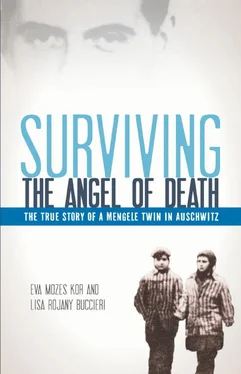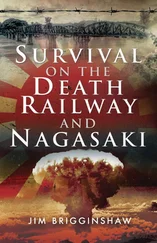In the afternoon and evenings, the disturbances continued. Teenage boys who belonged to the Hungarian Nazi Party, but who were not yet eighteen years old—the age at which they could begin to serve in the military—often surrounded our house and shouted obscenities at us for hours. “Dirty Jews!” they yelled. “Crazy pigs!” They threw tomatoes or rocks that smashed right through our windows. Other villagers joined in. Sometimes this would go on for three entire days with us unable to leave the house.
“Papa,” I called, “please go out and make them stop!” I wanted him to do something!
“Eva, there is nothing we can do about it. So just learn to take it.”
I could not have known it at the time, but Mama and Papa must have felt that if they tried to stop these juvenile delinquents or fight back, they would be arrested and taken away from us. At least we were all still together as a family.
Miriam and I huddled together in our bed, frightened. Our sisters stayed away from the windows. I know they were scared as well. Conditions grew increasingly worse. In June 1941, Hungary entered World War II as an ally, or partner in war, of Jew-hating Adolf Hitler and Germany, his country. Jews in other places in Europe were forced to wear a yellow star of David—the Jewish star—on the outside of their clothing or on their jackets to let everyone know that they were Jewish. We did not have to wear the yellow star, but everyone knew that we were Jewish. We were increasingly isolated in our village.
Unlike many Jewish children in Europe, Miriam and I were still allowed to attend school with other non-Jewish children, although it was progressively more difficult for us there, as the teasing and taunting did not stop. Our lucky older sisters, Edit and Aliz, were tutored in German, art, music, drawing, math, and history—all the subjects required in high school—by a Jewish teacher who lived with us at home.
As the light of autumn darkened into early winter, the days became shorter and our lives became more constricted. We did not venture to play outside or go into the village as much as we used to. Our parents never let on what they were feeling, but Miriam and I grew more and more afraid.
Then one night in late September 1943, Mama and Papa shook us awake. “Eva! Miriam!” they hissed urgently. “Get dressed! Put on your warm clothes, as many as you can get on, with your jackets and your boots. Do not light that candle! It has to stay dark. And be very, very quiet.”
“Wha-what are we doing?” I asked sleepily.
“Just do as you’re told!” murmured Papa.
We piled on our warm clothing and went into the kitchen. By the light of the glowing embers in the fireplace, we saw our older sisters standing there. They were bundled up as well, their faces like stones in the shadows.
Papa gathered the four of us girls together and whispered, “Children, the time has come when we must leave. We are going to try to get over the border to the non-Hungarian side of Romania where we will be safe. Follow us and remember: no noise.”
Single file, with Papa in the lead and Mama at the rear, we slipped out of the house into the darkness. Outside it was cold and windy. But at the time I had only one thought: We were in trouble, big trouble. And we were running away.
Silently we walked, one behind the other, to the back gate of our property at the edge of the orchard. Just beyond the gate lay the railroad tracks. No trains passed at night. It was silent except for the sounds of the crickets and the occasional call of a night bird. If we were to walk along the tracks for an hour or so, we knew we would arrive at the safe part of Romania. When Papa reached the gate at the edge of our property, he leaned over to unlatch it and pushed it open.
“Stop!” shouted a voice. “If you take another step, I’ll shoot!”
A Hungarian Nazi youth pointed a gun at us. A group of teenage boys wearing Hungarian Nazi armbands with swastikas and khaki caps had been guarding our farm, stationed there to make sure we did not get away. How long they had been there was anyone’s guess.
We were only six Jews. How could we be so important? I clutched Miriam’s hand, not daring to look directly at them, but sneaking sideways glimpses at the soldiers. Papa closed the gate, and the boys marched us right back to our house.
Our only chance of escape had just vanished.
On January 31, 1944, Miriam and I would turn ten years old. On family birthdays, Mama had always baked a cake and made the day a fun and festive occasion. But Miriam and I never got to celebrate our tenth birthday. Mama was too sick. Since October, just after the teenage Nazis had prevented our escape, she had been ill with typhoid fever and had stayed in bed all winter. In those days there were no simple medicines to ease the pains of fever and illness like there are today in every pharmacy. We worried about her and whether she would get better. Our mother had always been so strong and healthy.
A Jewish lady from a nearby village came to live with us to take care of our mother and run the house. Edit, Aliz, Miriam, and I helped by doing more than our usual share of chores on the farm. The Nazis and the Hungarian authorities were watching us, but we were never under house arrest or forbidden from leaving our home. For the moment, we seemed safe. We even continued to attend school, except on the rare days the Nazis did not allow us to go. On those days we were tutored at home like our older sisters.
Our relative freedom came to an abrupt end one morning in March, that year we turned ten. Two Hungarian gendarmes , or policemen, arrived in our front yard. Soon they were pounding on the door.
“Get your belongings! Gather them up. You are going to be moved to a transportation center.” This was not a request; it was a command. “You have two hours to pack.”
Mama barely had the strength to get out of bed. Papa and our older sisters bundled up food, bedding, clothing—all the necessities they could think of. Miriam and I wore matching dresses and took two other sets of identical clothes.
As the policemen marched us out of our home, everyone in Portz watched us leave on the one road that ran through the village. Neighbors came out of their farmhouses and lined the road. Our classmates from school just stared. No one tried to stop the gendarmes from taking us away. No one said a word.
I was not surprised. Once word got around that we had tried to leave in the middle of the night, conditions had continued to get worse; the harassment from the villagers and their children had grown uglier and more frequent.
Even Luci, Miriam’s and my best friend, stood very still, her eyes not meeting ours as we approached her house. She did not say she was sorry nor give us anything to remember her by to take on our journey. Just before we passed her house, I glanced at her. She looked down. In silence we left the home we had always known.
We were bundled into a horse-drawn, covered wagon. The policemen took us to a town called Simleul Silvaniei, about a five-hour ride away. Once there, we were forced to stay in a ghetto with more than seven thousand other Jews from our Romanian area of Transylvania. Miriam and I had never seen so many people. To us, one hundred people—the number of neighbors in our village—was a crowd. Seven thousand people—all of them Jews!—were more than we had ever seen at one time in our entire lives.
We later learned that Reinhard Heydrich, chief of the Third Reich security main Office, Adolf Hitler’s main office, had issued an official order: All Jews in Nazi-occupied areas were to be moved to special places set aside for them; these special places were called ghettos. We had not heard about these ghettos before. Ghettos were areas enclosed by fences, walls, or barbed wire and were set up in the most run-down sections of cities or the poorest parts of the countryside. Jews were forbidden to leave without a special permit, upon penalty of death.
Читать дальше












